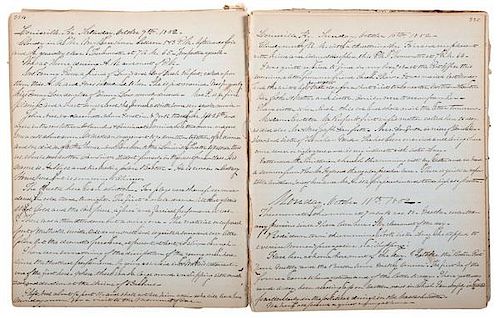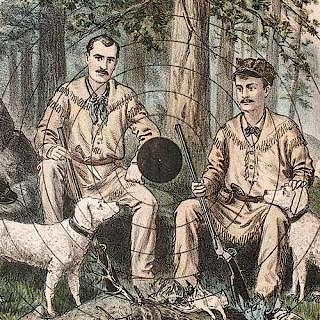Diary of George H. Sargent, Documenting Steamboat Journey Down the Ohio River, 1851-1853
About Seller
6270 Este Ave.
Cincinnati , OH 45232
United States
With offices in Cincinnati, Cleveland and Denver, Cowan’s holds over 40 auctions each year, with annual sales exceeding $16M. We reach buyers around the globe, and take pride in our reputation for integrity, customer service and great results. A full-service house, Cowan’s Auctions specializes in Am...Read more
Two ways to bid:
- Leave a max absentee bid and the platform will bid on your behalf up to your maximum bid during the live auction.
- Bid live during the auction and your bids will be submitted real-time to the auctioneer.
Bid Increments
| Price | Bid Increment |
|---|---|
| $0 | $25 |
| $500 | $50 |
| $1,000 | $100 |
| $2,000 | $250 |
| $5,000 | $500 |
| $10,000 | $1,000 |
| $20,000 | $2,500 |
| $50,000 | $5,000 |
| $100,000 | $10,000 |
About Auction
Nov 20, 2015 - Nov 21, 2015
Cowan's Auctions dawnie@cowans.com
- Lot Description
Diary of George H. Sargent, Documenting Steamboat Journey Down the Ohio River, 1851-1853
Diary, 398pp, of George H. Sargent’s daily activities, May 1, 1851-Jan. 10, 1853; 7.75 x 9.5 in.; “Programme” from Jenny Lind Concert, June 6, 1851; Boston Daily Journal, September 20, 1851, with complete accounts of the Boston Rail Road Jubilee including President Millard Fillmore’s visit and speech, and other newspaper clippings; 3 Harvard programs, 1851-1852; and Leicester Academy, MA, program.
Sargent’s diary provides comprehensive insight into several aspects of United States History in 1851 and 1852. The diary reveals Sargent as a young gentleman with an expansive variety of interests. His perspectives include academics, politics, the performing arts, personalities, historical events, travel, business, religion and recreation.
On May 13, 1851, Sargent describes his excitement as he viewed the speeches of President Millard Fillmore and Daniel Webster in New York City at the public celebration of the completion of the Erie Rail Road: President Fillmore is a fine looking man, has a pleasant and captivating look. At that time the Erie Railroad running from New York City to Dunkirk, NY, on Lake Erie in Chautauqua County was the longest railroad in the United States.
In late May, 1851, Sargent took his sister’s children to “ Barnum’s Menagerie and Traveling Museum” and wrote, General Tom Thumb was the only curiosity or animal in which I was interested. A few days later [6/1/1851] he writes, Heard two sermons from Rev. Henry Ward Beecher. Beecher is one of the most eccentric clergymen that ever preached. A Jenny Lind Concert on June 6, 1851 captivated Sargent. He writes, I was charmed, enchanted by her sweet warbling and wished I could hear her sing away, sing away forever. In a very short period he had seen in person several of the most famous personalities in America.
In June of 1851 Sargent was a student at Harvard who had been working temporarily in Brooklyn. He loved New York City but had to choose between continuing to work and returning to Harvard. A three week visit to Nantucket Island in July provided abundant socializing, sightseeing and recreation. On July 18th, he went “sharking” and landed 4 sharks. He returned to Harvard in late August, 1851. In September Sargent was gratified that the Massachusetts Whigs, his party, had nominated Robert C. Winthrop as their candidate for Governor.
Sargent saw John Wilkes Booth’s father play Othello in Boston on September 8th, 1851.
On September 17, 1851, Sargent was elected as marshal representing the Junior Class at Harvard for the Great Railroad Jubilee Procession in Boston. He walked into the ceremony with the Senators and got as good a seat as President Fillmore and Lord Elgin, the Governor General of Canada, for the military review.
Faneuil Hall speeches by prominent Whigs Rufus Choate and B. F. Thomas on November 7, 1851 added excitement to the voting process of an already energized Sargent. He went home to Leicester, MA to vote.
On November 8th, 1851, Sargent saw actor Edwin Forrest play Othello and proclaimed him better than Booth. He saw Miss Catherine Hayes known as “The Swan of Erin” Grand Concert on December 27th, 1851. He writes Regard Miss Hayes as the sweetest and best singer I have ever heard – Jenny Lind excepted. He often played the card game Whist.
Sargent entered Harvard Law School on April 12th, 1852.
By October 1st, 1852 Sargent had embarked upon an extended trip to visit his sister in Louisville, Kentucky. He left by train from Brooklyn, traveled across New York State and arrived in Niagara Falls, NY on October 2nd, 1852. He was very impressed by the stunning scenery of western New York. It was a fitting prelude to the sensory charge Sargent received at Niagara Falls. His reaction to the sights and sounds followed: All words are useless and inadequate. There is but one Niagara. Niagara . . . I know I love thee. On October 3rd Sargent boarded the steamer Empire State on Lake Erie bound for Cleveland. The steamer was late arriving in Cleveland. Two thirds of the passengers were sea sick. Lake Erie was not very kind to us. Because the steamer was late passengers were forced to take the mail train. Sargent writes, Had a one horse dinner in Cleveland and one horse accommodations since Buffalo.
Sargent arrived in Louisville on the Steamboat Lady Franklin from Cincinnati on October 7, 1852. Without a thick book of evidence he wrote a negative review of the south and Midwest. There is visible everywhere a don’t care appearance which is so characteristic of Southerners and Midwesterners.
October 24th, 1852 brought news of the death of Daniel Webster. An emotional Sargent wrote Webster is gone and when shall we see his like again? Great national loss and bereavement occasioned by the death of our country’s god. General gloom and a pale of sadness in the whole country. His fame is imperishable.
Sargent believed the next president and vice president would be Democrats Franklin Pierce and William King. The Whigs had nominated Winfield Scott and Sargent was disgusted at their choice. He writes What a farce for the Whigs to nominate Scott. Such a shallow man.
On November 14th, 1852 Sargent embarked upon a hunting trip to Henderson County, Kentucky and stayed at Mr. Finley’s hunting lodge. There are 6 slaves on the place. Three men, two women and a child he states. The return from hunting was on board the Steamer Empire State. There has been considerable card playing for money . . . . . but I detest gambling in all its forms.
On December 2nd, 1852 he viewed the launching of the Steamboat Falls City from Jeffersonville, Indiana. On December 11th, 1852 Sargent boarded the Bell Quigley to visit the natural wonder that was Mammoth Cave, Kentucky. His guide was an extremely knowledgeable slave named Steven who would be freed in 3 years. He describes Mammoth Cave as Visions of something supernatural.
After severe flooding all along the Ohio near Louisville, citizens moved to the upper stories of their homes on December 29th, 1852. By January 10th, 1853 Sargent had left his 3 month Kentucky home for St. Louis to become a salesman. At a young 24 years, Sargent had seen much with more ahead.The binding is in bad condition. the front cover is present, but not attached. it would need a new binding. The pages all seem to be present and intact.Condition
- Shipping Info
-
SHIPPING. At the request of the buyer, Cowan's will authorize the shipment of purchased items. Shipments usually occur within two weeks after payment has been received. Shipment is generally made via UPS Ground service. Unless buyer gives special instructions, the shipping method shall be at the sole discretion of Cowan's Auctions, Inc.. Cowan's is in no way responsible for the acts or omissions of independent handlers, packers or shippers of purchased items or for any loss, damage or delay from the packing or shipping of any property.
-
- Buyer's Premium



 EUR
EUR CAD
CAD AUD
AUD GBP
GBP MXN
MXN HKD
HKD CNY
CNY MYR
MYR SEK
SEK SGD
SGD CHF
CHF THB
THB















